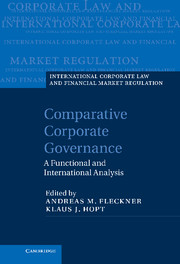Book contents
- Frontmatter
- Contents
- Contributors
- Preface
- Abbreviations
- Part I General report
- Part II National reports
- A Australia and Asia
- B Europe
- 6 Austria
- 7 Belgium
- 8 Denmark
- 9 Finland
- 10 France
- 11 Georgia
- 12 Germany
- 13 Hungary
- 14 Luxembourg
- 15 Netherlands
- 16 Norway
- 17 Poland
- 18 Portugal
- 19 Spain
- 20 Switzerland
- 21 United Kingdom
- C The Americas
- Part III Annex: Questionnaire
- Index
- References
6 - Austria
Legal framework of corporate governance
from B - Europe
Published online by Cambridge University Press: 05 July 2013
- Frontmatter
- Contents
- Contributors
- Preface
- Abbreviations
- Part I General report
- Part II National reports
- A Australia and Asia
- B Europe
- 6 Austria
- 7 Belgium
- 8 Denmark
- 9 Finland
- 10 France
- 11 Georgia
- 12 Germany
- 13 Hungary
- 14 Luxembourg
- 15 Netherlands
- 16 Norway
- 17 Poland
- 18 Portugal
- 19 Spain
- 20 Switzerland
- 21 United Kingdom
- C The Americas
- Part III Annex: Questionnaire
- Index
- References
Summary
General information about corporate governance
Introduction
There is no statutory definition of “corporate governance” under Austrian law. Corporate governance refers to the relationship between the management and the providers of capital and other interested parties in the company. Generally speaking, it is the body of different institutional arrangements that reveal and manage different principal–agent conflicts within a company. Corporate governance aims to establish an adequate legal, economic, and political framework for the efficient management and control of a company. Austrian corporate law is modeled after Germany's post-war Stock Corporation Act of 1965. Similar to the German law, the Austrian law is to a great extent mandatory. The reason is simple: the role model for Austrian company law is a listed company with a widespread ownership. Although the legislator in 1965 knew that there were only a few companies that fulfilled the legislative model, the concept was not reshaped and adapted to the economic reality of private corporations with one or a few dominant shareholders. One important reason was to keep the similarity to the German law. Another reason lay in the protection of the board against political influence. After the war, huge industries were nationalized. Therefore, the portion of state-owned companies running industries (steel, chemistry) was atypically high until the 1990s. One can only understand the Austrian development of corporate governance if one keeps in mind the legal starting point with the far-reaching mandatory corporate law and the small space left for individual freedom of legal discretion.
- Type
- Chapter
- Information
- Comparative Corporate GovernanceA Functional and International Analysis, pp. 274 - 309Publisher: Cambridge University PressPrint publication year: 2013

